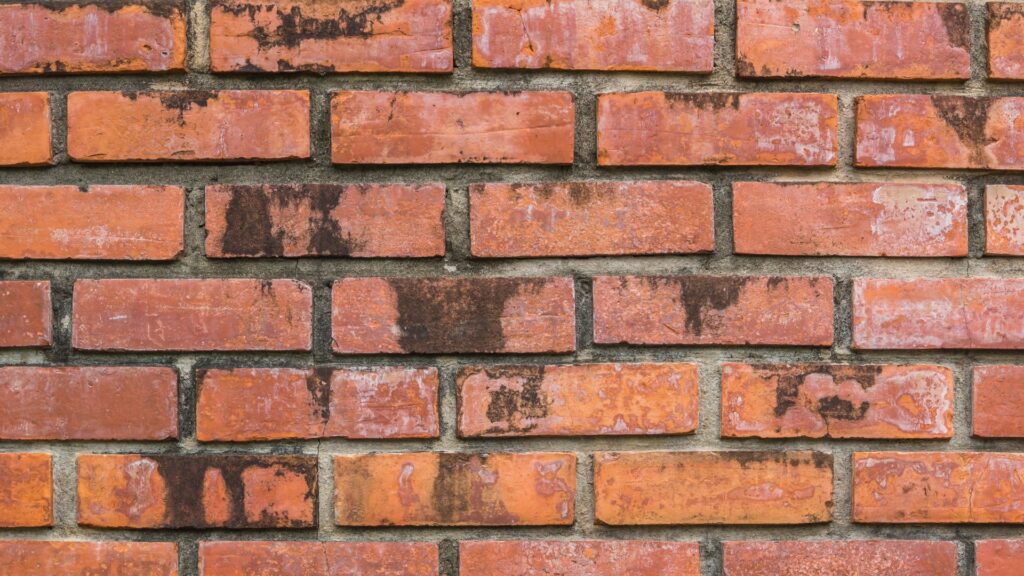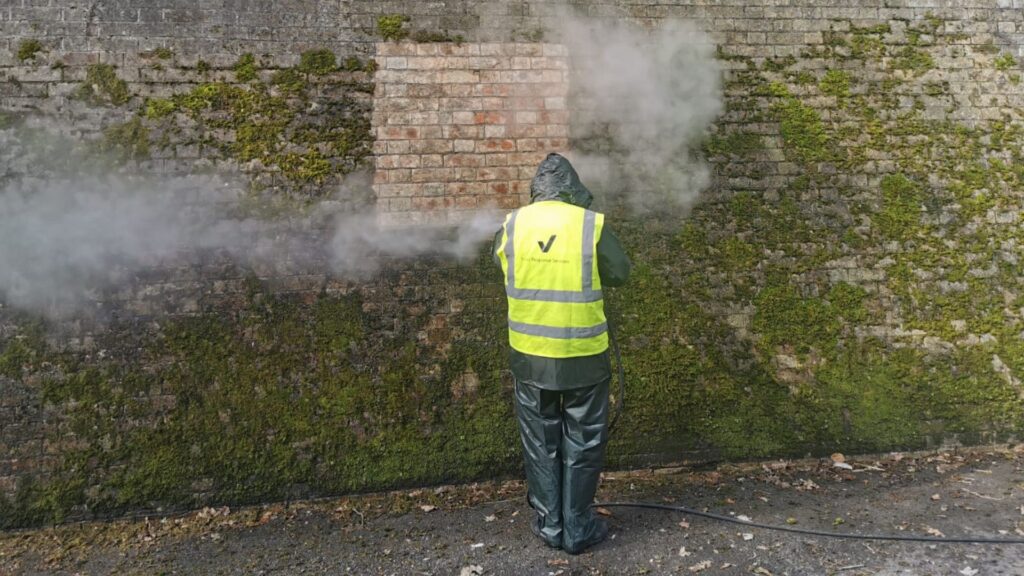
Pressure washing is a popular method for cleaning outdoor surfaces, but caution is essential when it comes to brick walls.
While it might seem like a quick fix to remove dirt, algae, or staining, using a jet washer on brickwork can lead to severe damage if not done correctly.
In this article, we explore whether it’s safe to pressure wash bricks, what the risks are, and the professional alternatives that deliver a thorough clean without compromising your property’s structure.
Why Clean Brick Walls in the First Place?
Brick is a durable material, but it’s also porous.
Over time, dirt, algae, moss, carbon deposits, and pollution can accumulate, making surfaces appear tired and deteriorated.
Cleaning brickwork improves your property’s appearance and prevents long-term structural damage.
Benefits of Cleaning Brickwork:
- Curb Appeal: Clean bricks instantly elevate the look of residential and commercial buildings.
- Prevent Decay: Moss, algae and grime trap moisture that can degrade mortar joints and brick surfaces.
- Extend Lifespan: Removing contaminants regularly helps maintain the strength and appearance of brickwork.
- Avoid Expensive Repairs: Proactive maintenance reduces the risk of needing costly structural remediation in the future.
Can You Jet Wash Brick Walls?
Pressure washers (also known as jet washers) are commonly used for outdoor surfaces like patios and driveways.
However, jet washing can be too aggressive when it comes to cleaning brick walls, especially older or weathered ones.
Risks of Pressure Washing Bricks
- Mortar Erosion: High-pressure water can dislodge mortar between bricks, leading to structural instability and moisture penetration.
- Surface Damage: Older or softer bricks may flake, crack or spall under intense water pressure.
- Water Ingress: A pressure washer too close to brickwork forces water deep into the wall, increasing the risk of internal dampness and mould.
- Uneven Finish: DIY pressure washing often leaves unsightly streaks and patchy results behind.
While some newer bricks may withstand light pressure washing, it’s not advisable unless you understand the proper nozzles, distances, and techniques — and even then, it’s a calculated risk.
What’s the Best Way to Clean Brick Walls Safely?
At Vinci Response, we use specialist cleaning systems that are both effective and safe for all types of brickwork, including heritage and listed buildings.
These include DOFF and TORIK cleaning systems, which are trusted throughout the remediation and conservation industries.
DOFF Cleaning System
The DOFF system uses superheated water at low pressure, making it ideal for delicate or historic bricks. It effectively removes:
- Biological growth (algae, moss, lichen)
- Pollution stains
- Paint residues
- Grease and grime
Because it cleans with heat rather than force, DOFF minimises any risk to mortar joints or brick surfaces.
TORIK Cleaning System
TORIK combines heat, steam, and adjustable pressure to clean without damage for tougher surfaces and more stubborn staining. It’s especially effective on:
- Brickwork with heavy carbon deposits
- Paint and graffiti removal
- Stained or aged modern brick surfaces
Both systems are eco-friendly and require no harsh chemicals, making them ideal for sensitive environments and properties of all ages.
Jet Washing vs Professional Brick Cleaning
| Cleaning Method | Effectiveness | Risk to Brick | Ideal For |
| Jet Washing (DIY) | Moderate | High | Newer bricks, driveways |
| DOFF System (Professional) | HIgh | Very low | Heritage & delicate brickwork |
| TORIK System (Professional) | High | Low | Stubborn dirt, urban pollution |
Common Questions About Cleaning Brick Walls
Can I pressure wash exterior brick walls myself?
Yes, but it’s not usually recommended. Incorrect pressure or technique can cause irreversible damage. Always test a small area first or consult a specialist.
Is pressure washing bricks safe for old houses?
No — older brickwork and lime mortar are especially vulnerable to high-pressure cleaning and require gentle, controlled methods like DOFF.
How often should brickwork be cleaned?
For most properties, cleaning every 3–5 years is sufficient. However, properties exposed to heavy traffic or pollution may require more frequent cleaning.
Why Choose Vinci Response?

When it comes to brick cleaning and building remediation, Vinci Response offers a level of expertise and care that sets us apart.
We understand that cleaning brickwork — particularly on older or more delicate structures — requires more than just the right equipment. It demands experience, precision, and a deep understanding of building materials.
Specialist Knowledge & Experience
Our technicians are fully trained in advanced cleaning systems, including DOFF and TORIK, ensuring your brickwork is treated with care and expertise. Whether it’s a residential property or a Grade II listed building, we tailor our approach to suit the surface and the surrounding environment.
Minimising Risk, Maximising Results
Unlike standard pressure washing, our cleaning methods are non-abrasive and designed to protect your property. We focus on delivering long-term results without compromising the structure or integrity of your walls.
Trusted by Commercial & Residential Clients
From private homeowners to facilities managers, Vinci Response is the trusted name for sensitive and effective cleaning solutions. We work to the highest standards of health and safety, and environmental compliance.
Nationwide Coverage, Personalised Service
We provide fast, responsive service across the UK while maintaining a personal, consultative approach to each project. Whether you’re dealing with brick discolouration, pollution staining, or the aftermath of storm damage, our team is ready to help.
Request a Brick Cleaning Assessment
If you’re unsure whether pressure washing your brick wall is safe, let our specialists help.
We can assess the condition of your brickwork and recommend the most appropriate cleaning method, preserving your property’s appearance while avoiding costly damage.
Contact us today to learn more about our brick cleaning services.